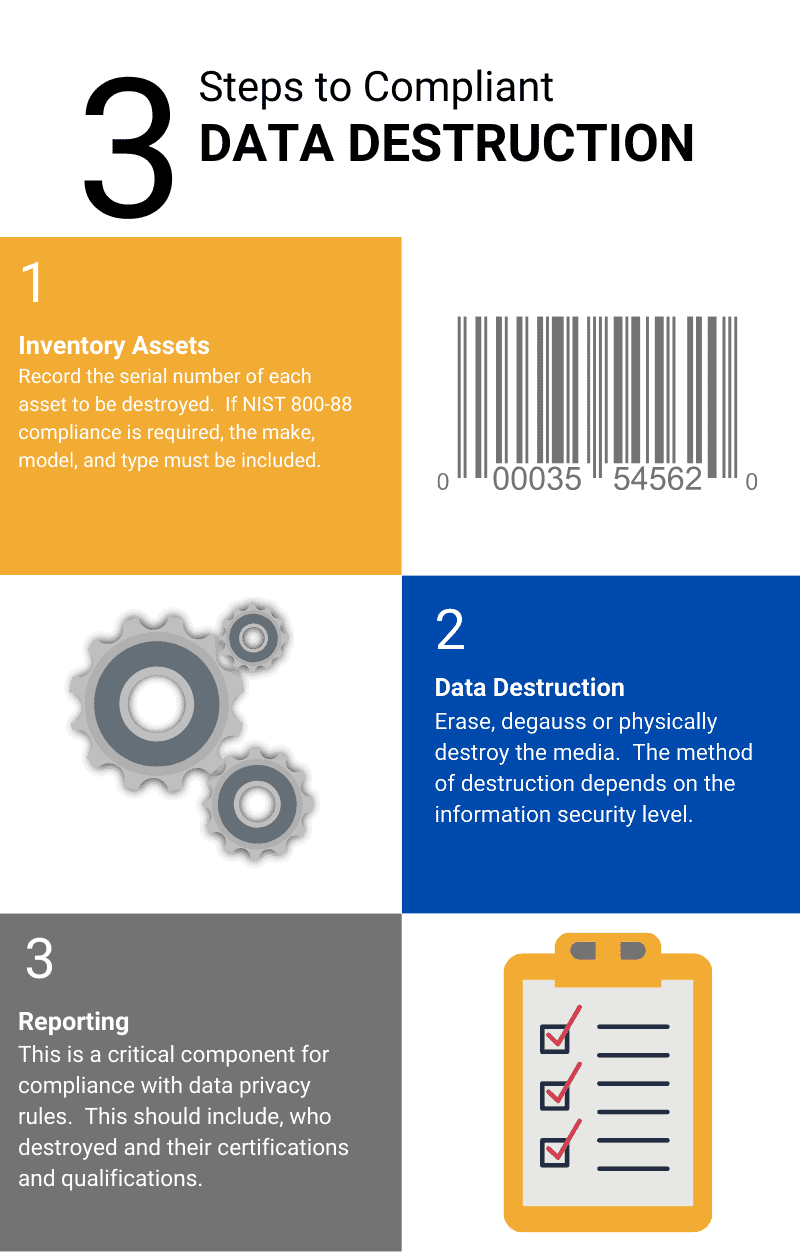Exploring the Value of Data Damage in the Context of Computer Safety And Security Services and Protecting Confidential Data
In an era where data violations are progressively typical, the importance of efficient information devastation can not be overemphasized. Organizations has to adopt strict measures to guarantee that sensitive info is not just protected during its lifecycle yet likewise emphatically removed when no much longer required. The techniques employed for information elimination, coupled with conformity to legal standards, play a crucial function in maintaining discretion and count on. The effects of these methods expand beyond plain compliance, affecting a company's online reputation and operational honesty in the digital market. What techniques can companies implement to boost their information destruction procedures?
Comprehending Information Destruction
Data damage is a crucial element of computer system safety that entails the irreversible elimination of data from storage gadgets to protect against unauthorized gain access to and possible data breaches. In an increasingly digital landscape, organizations encounter enhanced threats connected with sensitive information being incorrectly accessed or manipulated. Efficient data devastation safeguards versus these threats, ensuring that confidential dataâEUR" such as customer information, intellectual property, and financial recordsâEUR" can not be recovered after disposal.
Understanding the importance of data destruction expands past plain conformity with lawful and regulative frameworks; it is vital for preserving organizational integrity and count on. When data is improperly managed or improperly damaged, the effects can be extreme, consisting of monetary loss, reputational damage, and legal responsibilities.

Methods of Information Elimination

One prevalent method is data wiping, which includes overwriting existing data with arbitrary patterns several times. This strategy provides the initial information irretrievable, making it a prominent option for organizations seeking to secure secret information.
Another technique is degaussing, which utilizes a powerful electromagnetic field to interrupt the magnetic domains on storage devices, efficiently eliminating the information. This technique is especially efficient for magnetic media however is not suitable to solid-state drives.
Physical devastation is an additional robust technique, crushing or involving the shredding of storage space tools. This approach assurances that data recovery is virtually difficult, making it ideal for very delicate info.
Lastly, file encryption can work as a corresponding strategy to information eradication. By encrypting data before removal, organizations can include an extra layer of protection, making sure that also if remnants are recovered, they continue to be unattainable without the decryption key. Each approach must be selected based on the degree of data sensitivity and the details safety and security requirements of the company.
Legal Conformity and Information Protection
Organizations have to browse a complicated landscape of legal requirements associated with data security, particularly after applying techniques of information removal. Different policies, such as the General Information Security Regulation (GDPR) and the Wellness Insurance Transportability and Accountability Act (HIPAA), enforce stringent standards on just how organizations need to get rid of and deal with of sensitive information. Failing to abide by these guidelines can cause significant legal consequences, consisting of substantial penalties and reputational damages.
Data damage procedures have to be carefully recorded to show conformity with appropriate legislations and criteria. This documentation not only functions as evidence of adherence to lawful commitments but also shows a dedication to securing delicate information. Organizations must additionally develop clear plans pertaining to data retention and destruction timelines, guaranteeing that information is not held longer than needed.

Moreover, regular audits and assessments of information devastation techniques are necessary to keep conformity and adapt to developing legal frameworks (data destruction). By proactively attending to lawful needs, companies can minimize threats related to information breaches and demonstrate their dedication to information safety. Eventually, prioritizing lawful compliance in Get More Information data devastation procedures is not just a regulatory commitment, yet an essential aspect of a durable data safety and security strategy
Effect On Service Online Reputation
The Read More Here online reputation of an organization can be dramatically affected by its technique to information destruction and management. In today's digital landscape, where information breaches can take place at any minute, the failure to correctly get rid of delicate details can result in serious repercussions. Organizations that inadequately manage information damage danger subjecting private customer information, which not only breaches personal privacy legislations yet likewise deteriorates count on amongst stakeholders and clients.
A ruined track record can cause decreased client loyalty, as customers become hesitant to involve with a company that has actually shown negligence in shielding their data. Negative publicity surrounding a data breach can have an enduring result, as possible consumers might be deterred by the viewed lack of safety. This can cause a straight decrease in earnings and market share.
In addition, businesses that prioritize data destruction as part of their security strategy can enhance their credibility by showcasing their commitment to protecting sensitive information. By adopting stringent data monitoring techniques, companies can not just minimize dangers however likewise position themselves as trustworthy entities in their respective industries, therefore reinforcing their total brand image.

Best Practices for Secure Disposal
Applying finest methods for secure disposal of information is necessary data destruction for reducing risks connected with information breaches and guaranteeing compliance with privacy laws. Organizations must adopt a thorough information disposal policy that details procedures for both physical and electronic data damage.
For physical data storage space tools, such as hard disks, shredding or degaussing is advised to avoid data recuperation. Additionally, organizations need to preserve a chain of protection documentation throughout the disposal process, making sure accountability and traceability of disposed products.
For electronic data, making use of software that follows sector requirements for information cleaning is important. This software program ought to overwrite existing information numerous times, making recovery essentially difficult. It is also crucial to validate the effectiveness of the data damage process with audits or third-party analyses.
Educating employees on safe and secure disposal techniques includes an additional layer of safety and security, as human mistake can usually result in data direct exposure. Regularly upgrading and assessing disposal plans ensures alignment with progressing guidelines and technical innovations. By implementing these best practices, organizations can considerably minimize the danger of unapproved information gain access to and boost their total information defense approach.
Verdict
In conclusion, data destruction is a fundamental aspect of computer safety and security services that guarantees the security of private details from unapproved gain access to. Applying reliable approaches of information eradication, sticking to lawful conformity, and identifying the influence on organization reputation are essential parts of a comprehensive information protection approach. By taking on finest methods for protected disposal, organizations can foster trust with customers and secure sensitive data, inevitably contributing to an extra protected electronic landscape.
In an era where information violations are increasingly usual, the relevance of effective information damage can not be overstated.Information destruction is a crucial element of computer system safety and security that entails the irreversible elimination of data from storage space tools to avoid unauthorized gain access to and prospective information breaches. Organizations should likewise develop clear policies pertaining to data retention and devastation timelines, guaranteeing that information is not held longer than required.
By proactively addressing lawful demands, companies can reduce threats associated with data violations and demonstrate their commitment to information safety and security (data destruction). Inevitably, prioritizing legal conformity in information destruction procedures is not simply a regulatory responsibility, yet a fundamental element of a durable information safety and security approach
Comments on “Finest Practices for Data Destruction to Fortify Your Cyber Security Framework”